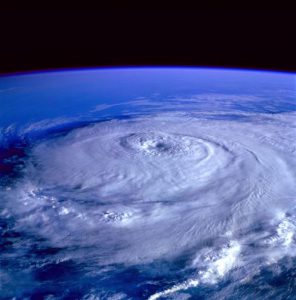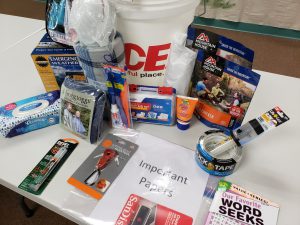
Hurricane Michael was the first ever Category 5 hurricane on record to impact the Florida Panhandle.
Are you ready? The 2019 Atlantic hurricane season began June 1. The official hurricane weather season continues until November 30, 2019. For Florida residents, it is never too early and not too late to prepare for this year’s hurricane season. NOAA’s Climate Prediction Center released a forecast prediction reporting a 40% chance of a “near-normal” Atlantic hurricane season and a 30% chance “above normal” indicating a range of 4-8 hurricanes, including 2-4 hurricanes of category 3 or higher. With this information provided as a means to increase disaster preparedness awareness, it is imperative that our families take action now to minimize the anxiety, stress, and hardships that occur when a disaster strikes. The following information details three family-friendly disaster preparedness activities to complete during the month of June to be hurricane ready for the 2019 season followed by useful informational links.
Build a Disaster Preparedness Bucket

The contents of a disaster bucket assembled by Wakulla County Emergency Management Director Jennifer Nagy.
One annual activity that families can do together is “build a disaster preparedness bucket.” Families may prepare large plastic storage containers with lids for hurricane snacks and other necessary items. In a storm situation where conditions may require you to move to safety, preparing a 5 gallon bucket with a lid full of recommended essential items will provide a portable, easy-to-store alternative that the whole family can use. Buckets may be purchased at local hardware or home improvement stores. In your area, organizations like your local city or county emergency management department or the Red Cross may offer a bucket giveaway program with pre-stocked disaster preparedness kits.
Talk About Your Communications Plan
As a family, decide who will be the point of contact for all members to contact in case of emergency. This activity is an excellent way to engage your child in critical thinking and problem solving. The person or people should be located outside the impacted area – a grandparent or other relative or family friend in another state would be one possibility. Provide each family member with a laminated contact list – with emails, phone numbers, and addresses – that can be kept in disaster preparedness kits, saved in phones, or stored in wallets and backpacks. Local business supply stores, mail or copy centers in your area may offer laminating services to make waterproof contact lists for safe storage and easy reference.
Have a “Meals To Ready” Taste Test Dinner
After a disaster, your family may be without power for several days or longer. To enjoy safe, hot meals, one option is “meals ready to eat” also known as MREs. MREs are a complete, filling & nutritious way to feed your family. MREs can be purchased online or in the camping section of stores like Bass Pro or Wal-Mart. These meals have a long shelf life and can be stored for months until needed. Some MREs include built-in heaters while others require boiling water to prepare. Camping MREs tend to be an entrée only. Military style MREs will have most, if not all, of the following components: entrée, side dish, bread, spread, dessert, cold drink mix, instant coffee, spoon, condiments, napkin, moist towelette, and a flameless ration heater.
Completing an MRE taste test as a family planning activity will help you determine which products your children will eat when the time comes to use the MREs. The taste test can be fun for the whole family – have everyone taste and then rate each meal or meal component on a scale of 1 to 5 – with 5 being the best possible in flavor and food quality. When you get ready to purchase a supply of MREs, you will know whether your family is going to prefer lasagna to white chicken chili and can shop with confidence!
For more information about hurricane season preparation or 4-H programs in your county, please contact your local UF IFAS County Extension Office, or visit http://florida4h.org.
Resources
- Build a Kit Online Games
- Build Your Bucket
- Disaster Readiness for Kids
- Family Communication Plan for Parents and Kids
- Large Storage Container Emergency Kit List
- Preparing Kids for Hurricanes
- All About Tabletop Exhibits for the North Florida Fair - September 10, 2024
- Beyond the Blue Ribbon: Make the Most of the 4-H Experience with Your Local Fair - July 5, 2024
- Tips to Help Youth and Families Handle Back-to-School Stress - July 28, 2023
